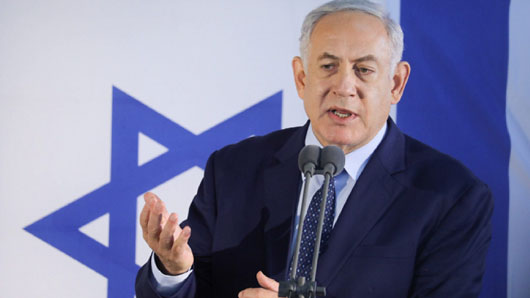by WorldTribune Staff, March 28, 2023 Freedom Is Not Free
Israeli Prime Minister Benjamin Netanyahu on Monday suspended his plan to overhaul the nation’s judicial system after mass protests and strikes rocked the Jewish state and its critical ties with neighbors and the United States.
“When it is possible to prevent a civil war through dialogue, I, as the prime minister, will take the time for dialogue,” Netanyahu said in an address to the nation on Monday evening.

Following Netanyahu’s announcement, Israel’s largest labor union called off a nationwide strike that had grounded flights, closed banks and government offices and left hospitals working with skeleton crews.
“From the streets of Tel Aviv to the halls of the Knesset, Netanyahu faced a revolt over his proposed judicial overhaul that appeared to threaten his coalition’s grip on power,” a March 27 Wall Street Journal report noted.
Netanyahu vowed to continue to advance the judicial overhaul once Israel’s parliament reconvenes at the end of April.
“Netanyahu and his ultranationalist and religious allies have long argued that the courts are controlled by liberal, activist judges who can too easily overturn the will of elected lawmakers,” the Journal noted. “They say the courts have seized wide-ranging powers and become a bastion of minority rule, striking down laws supported by a majority of Israelis, such as those cracking down on African asylum seekers.”
Writing for Jewish News Syndicate (JNS), David Isaac noted that the Netanyahu government “wants to adopt a system of selecting judges more in keeping with the American model, which means politicians will be in charge. It’s a key element of the coalition’s judicial reform plan.”
Currently, judges in Israel are chosen by a Judicial Selection Committee made up of three Supreme Court judges, two government ministers, two Knesset members, and two lawyers from the Israel Bar Association.
“As seven of the nine members are needed to approve a candidate, and the three judges vote as a bloc, they have veto power over nominees. Given that the lawyers typically vote with the judges, the judges also end up with a solid majority,” Isaac wrote.
Eugene Kontorovich, director of international law at Kohelet, told JNS: “The notion that having elected governments fill judicial vacancies is undemocratic is preposterous, as it is how most democracies function. What makes judges independent is their not being able to be fired, not how they are selected. No one thinks RBG [U.S. Supreme Court Justice Ruth Bader Ginsburg] was a political hack because she was appointed by a Democratic president.”
Referring to a public debate last week over whether the Supreme Court has the authority to strike down laws regarding judicial selection, Kontorovich said: “The suggestion that judges can actually veto legislation dealing with the system of judicial appointments—that they can decide not just on the constitutionality of laws but on how they are picked—would make a mockery of the rule of law, defy all notions of separation of powers, and cause a deep constitutional crisis. There are legitimate debates about the best way to pick judges—through elected officials, as in most democracies, or by professional committees, as in some. But in no democracy is that choice left to the judges themselves.”
Opposition leader Yair Lapid said he would enter into talks with Netanyahu only if the legislation stopped “genuinely and totally. If he tries anything, he’ll find hundreds of thousands of patriotic Israelis who are committed to fighting for our democracy standing opposite him.”
Some protest organizers said Netanyahu’s speech wouldn’t affect the movement.
“We will not stop the protest until the judicial coup is completely stopped,” said a statement from the Umbrella Movement Against Dictatorship, a group organizing protests against the judicial overhaul.
Netanyahu on Sunday fired his defense minister, Yoav Gallant, who had called for the judicial overhaul to be scrapped.
Gallant’s dismissal prompted hundreds of thousands of Israelis to hit the streets across the country, with demonstrators gathering outside Netanyahu’s home in Jerusalem and protesters setting large fires on Tel Aviv’s main highway.
Mass protests again broke out across Israel on Monday, flooding into the streets surrounding Israel’s parliament, or Knesset, in Jerusalem, and Supreme Court, chanting “democracy or rebellion” and waving blue-and-white Israeli flags.
Israel’s parliament had been expected to vote this week on the first pillar of the overhaul, which would have given Netanyahu’s governing coalition a majority on the committee that appoints judges. Other parts of the overhaul aimed to limit the Supreme Court’s jurisdiction and allow a simple majority of lawmakers to override the high court’s decisions.
Action . . . . Intelligence . . . . Publish
